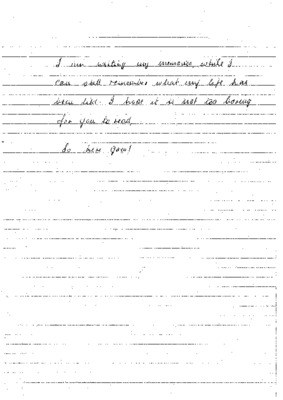Margaret Dixon's account of her early life and service in the Women's' Auxiliary Air Force
Title
Margaret Dixon's account of her early life and service in the Women's' Auxiliary Air Force
Description
13 handwritten pages, Margaret describes in some detail her early life and service in the WAAF as a nurse.
This item was sent to the IBCC Digital Archive already in digital form. No better quality copies are available.
This item was sent to the IBCC Digital Archive already in digital form. No better quality copies are available.
Creator
Spatial Coverage
Language
Format
13 handwritten pages
Conforms To
Publisher
Rights
This content is available under a CC BY-NC 4.0 International license (Creative Commons Attribution-NonCommercial 4.0). It has been published ‘as is’ and may contain inaccuracies or culturally inappropriate references that do not necessarily reflect the official policy or position of the University of Lincoln or the International Bomber Command Centre. For more information, visit https://creativecommons.org/licenses/by-nc/4.0/ and https://ibccdigitalarchive.lincoln.ac.uk/omeka/legal.
Identifier
BDixonMDixonMv1
Collection
Citation
Margaret Dixon, “Margaret Dixon's account of her early life and service in the Women's' Auxiliary Air Force,” IBCC Digital Archive, accessed July 27, 2024, https://ibccdigitalarchive.lincoln.ac.uk/omeka/collections/document/40631.
Item Relations
This item has no relations.

